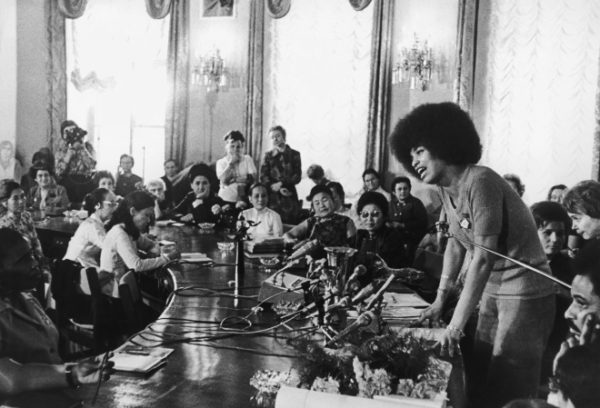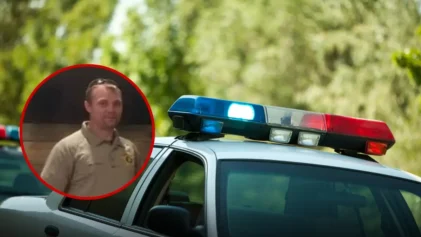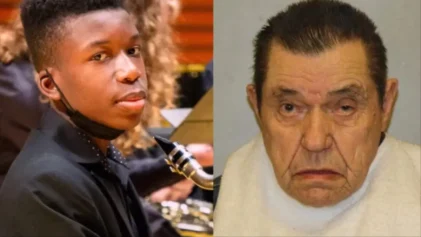Communist activist and longtime University of California Santa Cruz professor Angela Davis recently learned to her disbelief that her ancestry traces back to America’s founding.
For a woman known for her lifelong advocacy of Black liberation, her reaction on Henry Louis Gates’ “Finding Your Roots” has become a viral moment seen by millions.
“Do you know what you’re looking at?” Gates asked.
“That is the list of passengers on the Mayflower,” he continued.
Davis initially laughs off Gates’ comments in a surprised tone.
“No, I can’t believe this. No, my ancestors did not come here on the Mayflower,” Davis said.
The revelation produced a surreal moment for Davis as she took a deep breath and sighed before processing what she was learning.
“That’s a little bit too much to deal with right now,” Davis replied.
“Did you ever in your wildest dreams think that you’re a descendant of people who laid the foundation of this country?” Gates asked.
“Never! Never. Never. Never,” Davis replied still stunned.
Gates told Davis her 10th great-grandfather on her father’s white side was William Brewster, who was born in England in 1570.
Gates also revealed to Davis her mother’s family lineage traces back to owners of enslaved people in Georgia in the 1770s.
“I always imagined my ancestors as the people who were enslaved,” Davis said. She went on to say knowing her family lineage owned enslaved people makes her more committed to making the world better.
Davis said she took a DNA test to learn more about her mother, Sallye Bell’s, side of the family because she grew up in a foster home. Gates revealed to the stunned Davis, her mother’s white father, John Austin Darden was an Alabama legislator.
Davis learned her father, Benjamin Frank Davis, was also half white, but he never revealed that to her.
The shocking family history is more profound for Davis, 79, due to her decades-long commitment to political activism. She was once widely believed to be the face of a Black liberation movement. Her activism rose to prominence in 1969 when she advocated for three Black men incarcerated in the Soledad Prison in Soledad, California.

On Jan. 16, 1970, George Jackson, Fleeta Drumgo and John Cluchette were falsely accused of murdering a white prison guard, according to UCLA. The men became targets because of their politics promoting Black liberation and the Black Panther Party.
Davis launched a fierce campaign to free the men known as the “Soledad Brothers.” Her advocacy ultimately cost her her professorship at UCLA because of her own affiliation with the Communist Party.
During Jackson’s trial, Jackson’s 17-year-old younger brother Jonathan Jackson smuggled guns into the courthouse in an attempt to break out his brother, leading to a courtroom shootout in which several people were killed, including Jackson and the judge.
Authorities accused Davis of being a participant in the escape attempt, and she was charged with murder. The guns used in the courtroom shooting were registered to Davis. Afterward, she went into hiding, and the FBI placed her on its Most Wanted list.
Davis ultimately served nearly a year and a half in jail. Her supporters launched “Free Angela” campaigns which garnered her enough support to help pay her $102,500 bail. She was released from jail on Feb. 23, 1972, and her charges were acquitted in June of that year.
The viral social media clip revealing Davis’ family ties tracing back to the Mayflower was seen more than 4 million times in less than 24 hours. Social media users shared a similar range of emotions after the stunning revelation.
“OMG! Angela Davis and I are related. Through William Brewster! Thank you @HenryLouisGates!” Barbara Adams wrote on Twitter.
Another Twitter user replied by saying, “How did you completely miss that Ms. Davis herself was devastated?”
Boston medical doctor, Adaobi Ikpeze, chimed in by making reference to when the first Africans came to America. The “enslaved arrived one year before Mayflower and built Jamestown in 1619,” she said.
Sue Hutton pointed out Davis’ disposition as she learned more from Gates.
“She seems so uncomfortable throughout this entire episode…no joy in finding about her ancestry. Having family in the South, she must have had some idea that her ancestors were enslaved individuals,” Hutton wrote on Facebook.
“I didn’t think she was uncomfortable. She also said she knew her ancestors were likely enslaved people. She did not know the extent of her Caucasian roots nor their prominence! THAT was a big surprise!” Judi Marie replied.
After learning her roots, Davis said she felt “glad and angry” as the segment ended.


